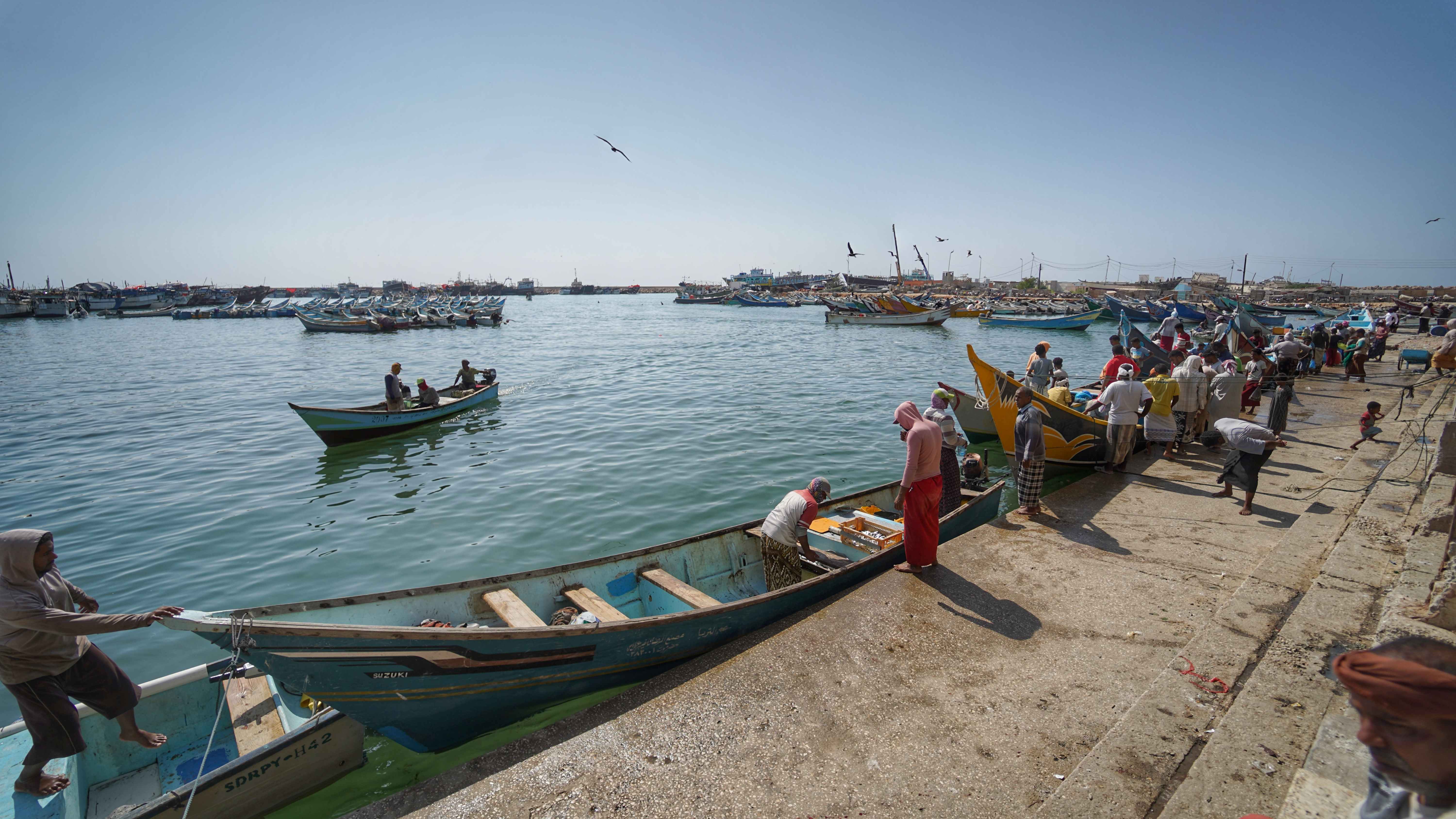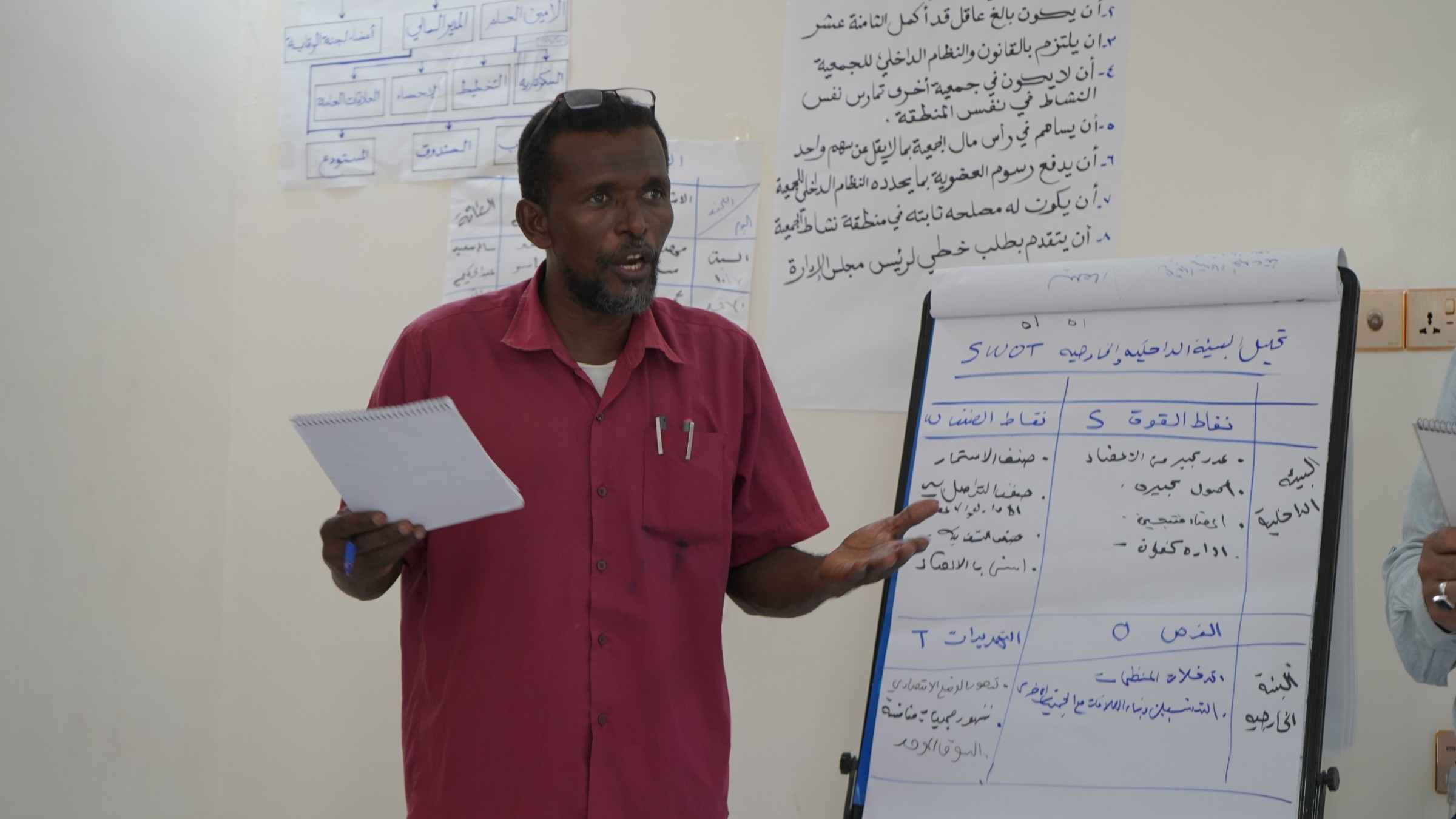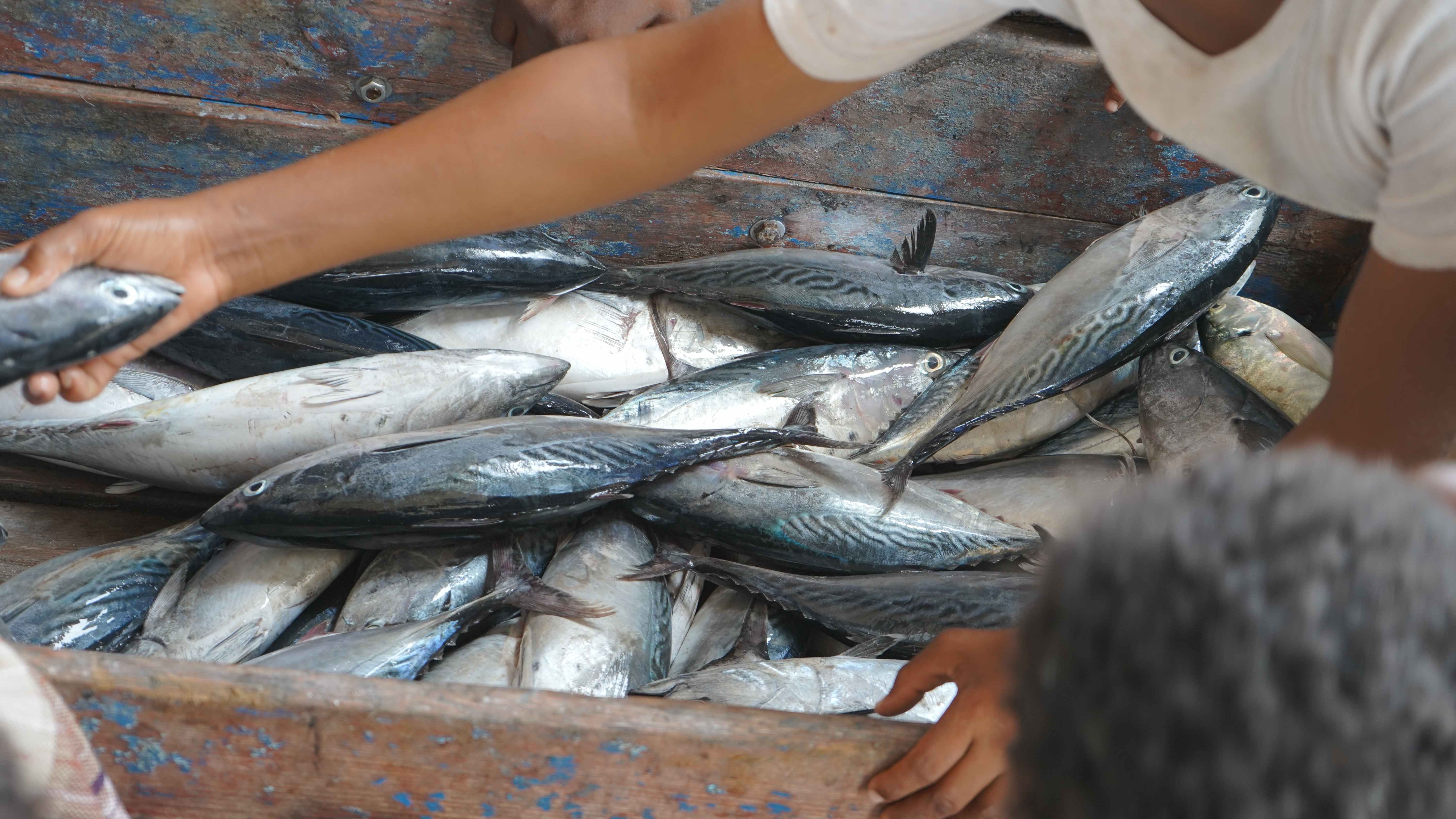The Sail of Hope Makes Its Way Toward Development and Sustainability

Yemen, the land of beauty and suffering, undergoes hard times. Instability affects all sectors, including the fishery sector, one of the pillars of the national economy, in a time with problems facing the fishery cooperatives in ongoing increase. While the domestic production in such a vital sector is declining and workers' economic conditions are deteriorating, the seed of hope was planted, thanks to the Fishery Cooperatives Capacity Enhancement Project in the Shabwa Coastal Strip. Realizing the importance of the role of fishery cooperatives, the Small & Micro Enterprise Promotion Service (SMEPS) left no stone unturned to enhance the capacity of six fishery cooperatives in Shabwa's Costal Strip in Radhoum district, which brought back hope to the hearts of the workers in the fishery sector in the region.
Director of the Planning and Studies Department in the Social Welfare Fund (SWF) and trainer of the participants, Abdulbasit Ba-Khadhir states, "Most cooperatives own unused assets. Providing such cooperatives with technical support and counseling will equip them with all the requirements to make use of those assets and benefit from them, thus both cooperatives and fishermen will benefit financially." He adds, "Cooperatives face issues in regard to overlapping functions and responsibilities, relations among cooperatives, relations between cooperatives and the fishery service and the Social Affairs and Labor of the Governate." Abdulbasit confirms, "The training is based on the idea of institutional building and good government. It contributes to the institutional development of each cooperative to ensure future success. Eventually, all cooperatives will become able to achieve sustainable growth and improve their overall performance effectively."
Since building capabilities is essential to achieve sustainable change in the fishery sector and enhance the knowledge and the technical and administrative skills of the cooperatives' members, the project focused on developing the participants' institutional skills. Much attention was given to the organizational structure and cooperatives made initial plans. All cooperatives determined their objectives and made practical plans to realize them. Also, training that included aspects of environmental analysis of the facility and service development was included, in order to enhance the trainees' skills and enable them to manage their businesses efficiently.

Regarding the benefits that the trainees gained, Abdul-Hakeem Omar Bin-Eiadah, a member of Belhaf Cooperative says, "The training increased our awareness of the institutional building of the cooperatives and opened up new doors for the development of our cooperative as we learned about planning, organizing, monitoring and making the right decisions according to the typical management of the cooperatives."
To increase their experience, the trainees conducted field visits to the typical cooperatives in Hadramaut, such as Al-Mukalla's Fishermen Cooperative, and Asl-Shihr Fishery Production Cooperative. During the visits, the strength points and the challenges that those cooperatives face were highlighted. Experiences were exchanged and the successful projects conducted by the cooperatives were observed. After the field visit, the initial plans of the trainees' cooperatives were modified. The modifications included the plans of two projects that will be conducted in cooperation with a donor, aiming to provide new opportunities and funding for the purchase of modern fishing boats and advanced fishing equipment in addition to building fish refrigeration and preparation facilities.
The financial manager of Beer Ali Cooperative, Yasser Al-Wasei'ah, describes the skills he gained from the training and the field visits by saying, "During the training, we had some ideas about the institutional building of some typical cooperatives. They shared with us their objectives, administrative management, and organizational structure. Based on what we learned in the training, I noticed some improvements in my skills and capabilities, which will enable me to create new opportunities and find funding resources whether they are fishermen's, government, or supporting organizations' resources. The most important thing is generating ideas by the cooperatives' leadership to find new resources to improve the cooperatives' income and provide their members with equipment and boats to help them improve their living conditions." He also highlighted the importance of such training courses in improving the capabilities and skills of the workers in the fishery sector. Moreover, he pointed out their impact on the enhancement of the living conditions of fishermen.
SMEPS works hard through such projects to turn fishery cooperatives into an influential player in the region by enhancing their capabilities and the skills of their members. It provides them with fishery equipment and methods, fuel, fishing-trip requirements, and extension and training services for fishermen. SMEPS also helps cooperatives find variable and renewable marketing channels to sell fish at reasonable prices and develop marketing systems to address the weak marketing of small-scale fishermen to compete in the market. It also helps create new opportunities and find funds for its projects. Fisherman Salem Mohammed Othman says, "We now realize the role of the fishery cooperatives in helping fishermen. Whenever such cooperatives grow for the better, the fisherman grows too, and many things become available to him."

The project showcases an outstanding example of enhancing the capacity of fishery cooperatives and achieving sustainable development in the fishery sector. It is a story that inspires and encourages to maintain efforts in order to enhance capacity and sustainability in the fishery sector. Ahmed Salem Says, "We thank SMEPS for their efforts and the training they conducted in the region. I hope they will train the wives of fishermen to develop our industry and improve our living conditions now that wives help drying and grinding fish. Finally, I wish SMEPS much success." Abdulbasit Ba-Khadhir Adds, "I hope that the training course will be the foundation stone for sustainable training for cooperatives in Radhoum, Shabwa, and other cooperatives along the coastal strip."
Finally, the sail of hope of fishery cooperatives keeps sailing across Shabwa's coastal strip. It is expected that this sector will have an economic and social boom as time goes by, which will help fishermen paint a picture of a promising future for their village on the shores of the sea. This story highlights the idea that joint action and cooperation among relevant authorities can bring positive results and help achieve sustainable development in the fishery sector and many other economic sectors.